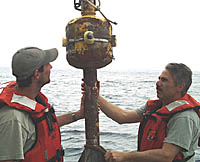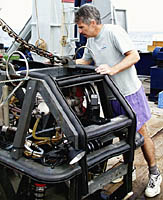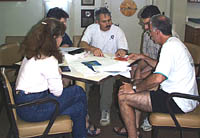|
|
Interviews: Chief Scientist Dan Fornari
Question:
How did you end up going into oceanography? Dan: I got my Bachelor of Science degree in geology at the University of Wisconsin, Madison. When I was a freshman, I took a course in geology and another in oceanography -- and I was hooked. I liked the subjects so much that, in 1969, after my freshman year, I applied for a summer job to many different oceanographic schools. I ended up getting a job at Scripps Institution of Oceanography where I worked for two geophysicists, Dr. Vic Anderson and Dr. George Shor, Jr. I loved it! Dr. Shor asked me back the next year to sail on the maiden voyage of RV Melville, so I spent 3 months in the summer of 1970 going from San Diego, up to the Aleutian Islands, and then to Japan. I was living my dream -- being at sea, traveling to foreign ports and doing oceanography. But there were parts of that first cruise that were not so great. I hated the food, mostly because I was sea sick a lot, and when we hit very rough weather in the Gulf of Alaska, there were times that I thought I had made the wrong decision to be an oceanographer. After that cruise, I continued to work for Dr. Shor during the summer months and after I graduated from college. I was offered a job as a Resident Technician on the Scripps ships, doing just what Ron Comer and Randy Dickau are doing on this cruise. I was a Resident Tech. for a little over a year at Scripps, and then decided I wanted to get my Ph.D. in marine geology. I started graduate school at Lamont-Doherty in 1972. There, I worked with Bruce Heezen for a few years, and after that, Bill Ryan and Walter Pitman were my advisors and mentors. Since I started going to sea, I’ve been on about two or three research cruises each year for almost 30 years. I’m amazed to realize that about a quarter of my adult life has been spent out on research ships investigating the ocean floor. Another big factor has been the support that I’ve gotten from my parents who always encouraged me in my geological studies, even though they were always worried when I went to sea, and especially when I started diving in Alvin. They still worry about me, but they also think that what I do is interesting. Question: What are your main responsibilities on this cruise? Dan: As chief scientist, I make sure that we accomplish our research objectives and get as much science done as we can -- that we are doing a responsible job of spending tax payers’ money on basic research. I talk several times each day with the Captain, the crew, and many people in the science party to ensure that the work gets done efficiently, and that we make the most of our time out here. I collaborate with my co-PIs so that we can make the best decisions together. I also show the students by example how to do this type of research and what it is like to do science out at sea.
What do you do on a typical working day at sea? Dan: Generally I get up at 4 a.m. to help Maya with her watch. I make sure that the vehicle navigation is correct, and that we are going where we are supposed to. I check on the data quality, and that it is being logged correctly. I check with the Captain and the Resident Technician to ensure that they know what our plans are so they can help us get our work done safely and efficiently. Also, I organize some of the people in the science team to help me with compiling the material we use for the Dive and Discover web site, which is a lot of work! Question: How did you end up working at Woods Hole Oceanographic Institution? Dan: I had been doing research at Lamont-Doherty Earth Observatory for about 13 years, using Alvin and different sonar systems to map the seafloor in different areas around Hawaii, on the mid-ocean ridge in the eastern Pacific, and on the Mid-Atlantic Ridge. I was looking for a new position when I was approached by the Chair of WHOI’s the Geology and Geophysics Department. He asked me if I would be interested in joining the Department, and also in providing science guidance to the Deep Submergence Operations Group (DSOG) at WHOI, to help make the instruments that they develop and operate more useful to the science community. I agreed and have been there since 1993. The past 7 years seem to have flown by. Not only have I been busy with many research programs, but I have also been helping the DSOG and many different researchers make the most of Alvin, ROV Jason, and the DSL-120 sonar and Argo II mapping systems. It has been very gratifying to see how the deep submergence vehicles are now is such demand by many different scientists. Question: What do you like most about your job or being at sea? Dan: I always find the science I do interesting and enjoy the puzzle-solving nature of it. Figuring out how the Earth works is a grand puzzle with lots of different pieces; geology, geophysics, chemistry, even biology! Most of the research I do is collaborative, meaning I work with different scientists who each bring a particular expertise to the problem we are studying. Mike, Rachel, and I have been working together on different research problems for many years. Working with friends who are also research colleagues is both rewarding and enjoyable. I like working in a team to solve problems. I also particularly enjoy the variety in my work - the fact that I get to do so many different things from day to day. I also like the fact that you get to decide what you do everyday, although often that means you drive yourself harder than others would. I also like the unique events you get to witness at sea. From flat calm seas in the middle of the ocean, to terrible weather only 100 miles from the shore, which is so near yet so far away, to ocean life that is so bountiful, to the night sky filled with constellations and shooting stars. I remember two particularly memorable events. One was in the Gulf of Panama transiting back to port, and for half an hour seeing a school of manta rays doing back flips. The other was pulling into Tahiti after a long cruise, sailing around the island, and seeing turquoise blue water, coral reefs, palm trees, and volcanic peaks in the distance -- it was just like the stories I had read as a child. Question: What do you like least about your job or being at sea? Dan: I don’t like being away from home because I miss my family enormously. I have spent about 25% of my professional life away from home, which means I miss a lot, especially with my kids when they were growing up. It’s very tough to recapture what you miss. CL, my wife, is terrific. I would not have been able to get as far as I have with my work without her help. She has always been extremely supportive of my work and the fact that I have to be away for long periods of time. I also miss Hector, my dog, who goes in to work with me every day. He’s found a second home in the Department at WHOI, and everyone is really good to him - too good sometimes because he goes begging for biscuits all the time!
|
||||||
|
|
|||||||
© 2010 Dive and Discover™. Dive and Discover™ is a registered trademark of
Woods
Hole Oceanographic Institution



